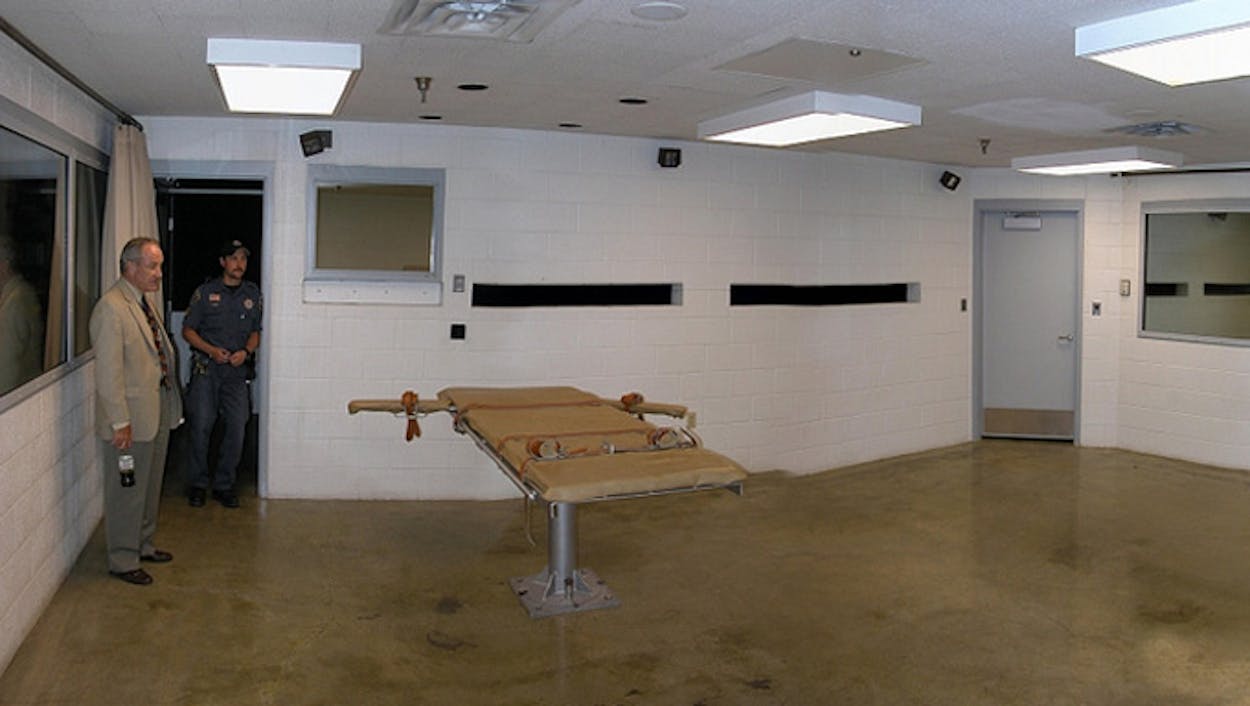Texas has been running low on pentobarbital—the drug it uses in lethal injections when carrying out executions—for some time now. In 2013, it started obtaining the drug from compounding pharmacies, creating a mini-scandal for the Woodlands Compounding Pharmacy, which published a letter asking the state to return the supply it made after the company was revealed as the state’s source. (“Based on the phone calls I had with Erica Minor of [the Texas Department of Criminal Justice] regarding its request for these drugs, including statements she made to me, it was my belief that this information would be kept on the ‘down low,'” Jasper Lovoi, the pharmacist’s owner, wrote at the time.)
The need for compounding pharmacies to manufacture pentobarbital came about after the drug’s major suppliers—European pharmaceutical companies—opted to make the drug unavailable to states like Texas that intended to use it in executions. And as stateside compounding pharmacies like Lovoi’s became uncomfortable with being publicly identified with executions, a new issue came up: How would the state obtain the drug when even small-batch domestic pharmacies refuse to sell it for use in executions?
In what appeared to be a workaround for that problem, the TDCJ declared last year that it wouldn’t make information on providers available, vowing to appeal a state court’s ruling that the identity of the suppliers was public information. Then, during the most recent legislative session, the challenge in state court became moot: SB 1697 passed in both houses in May, exempting the names of execution drug suppliers from the public information provisions of Texas’ open government code.
Still, it appears there are some difficulties in getting the drug. Last week it was revealed that a shipment bound for Texas of sodium thiopental—another drug that’s capable of being used in executions—was confiscated by the Food and Drug Administration. As ABC News reported:
Compounding the nation’s severe shortage of execution drugs, federal authorities have confiscated shipments of a lethal-injection chemical that Arizona and Texas tried to bring in from abroad, saying such imports are illegal.
The Food and Drug Administration said Friday that it impounded orders of sodium thiopental, an anesthetic that has been used in past executions in combination with drugs that paralyze the muscles and stop the heart. It currently has no legal uses in the U.S.
“Courts have concluded that sodium thiopental for the injection in humans is an unapproved drug and may not be imported into the country,” FDA spokesman Jeff Ventura said in a statement.
The fact that sodium thiopental has no legal use in the U.S. and is unapproved for the injection into humans should make this a fairly clear-cut issue. At the very least, part of the FDA’s job is to stop the import of drugs that aren’t authorized for use in this country.
There’s another issue at hand when it comes to the importation of drugs from overseas pharmacies, though: we don’t know what’s actually in them. It might be sodium thiopental; it might not. There are countless international websites promising to ship any number of drugs to anybody in the U.S. with a credit card, and the Indian pharmaceutical company responsible for the shipment to Texas doesn’t seem at first glance to be particularly reputable—the business address in Kolkota that’s associated with the company leads to a residence, and when the Associated Press tried to contact the owner, no one was available.
All of which leads to the big issue at hand, both with the illegal import of drugs purporting to be something that will kill a person if you inject enough of it into them, and with the anonymous compounding pharmacies that the legislature exempted from public information requests: With illegal imports and secret pharmacies, there’s very little accountability for what’s actually in the needle. Texans simply have to trust that a compounding pharmacy that’s guaranteed the right to avoid public scrutiny are doing a good job and that those vials are filled with the correct drug. The consequences for getting it wrong are unknown and left up to the state.
But that lack of accountability is part of how executions work in Texas now. Texas law requires all executions to be conducted by lethal injection. That’s been the case since 1977. But even though the supply of the drugs has been dwindling for years, and the situation is apparently serious enough that the state is importing a drug that’s not authorized for injection into humans, the legislature failed to enact any other measures besides guaranteeing the compounding pharmacies anonymity. They didn’t approve alternate methods of execution; they didn’t push to authorize drugs that they could access.
Every time the debate over execution drugs comes up, death penalty supporters tend to chime in to remind people that bullets are cheap and plentiful. That may be true, but they’re also illegal for the state to use in executions—and the Texas legislature had the opportunity to change that in the last session and did not.
All of which makes the death penalty in Texas that much more controversial. Though capital punishment is still largely supported (polling data seems to put public support around 70 percent), when it comes to how we carry those executions out, our leaders seem satisfied with an increasingly difficult-to-achieve status quo. Lethal injections are relatively clean and antiseptic, a medical procedure. States like Utah and Tennessee, which have also struggled with the limited supply of drugs, have authorized the use of messier means—firing squads, electric chairs—as alternatives. In Texas, though, we apparently want our executions done quietly and cleanly—and with drugs of unknown provenance.








